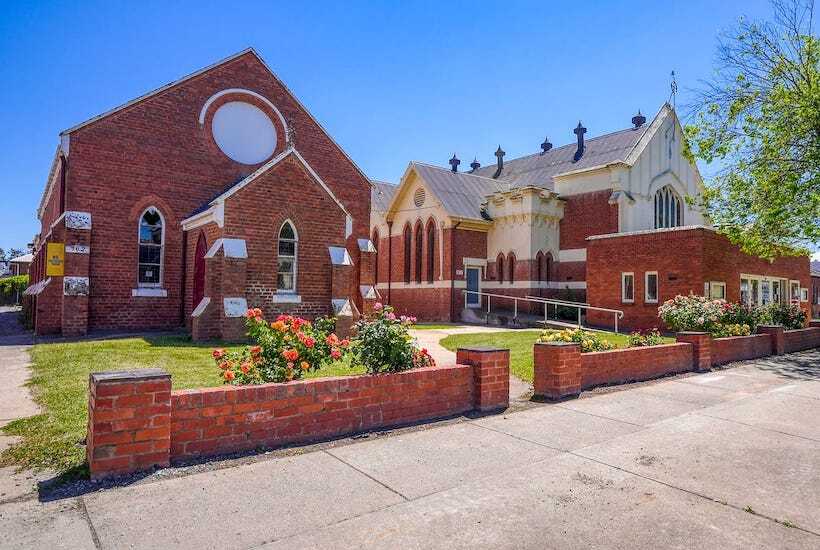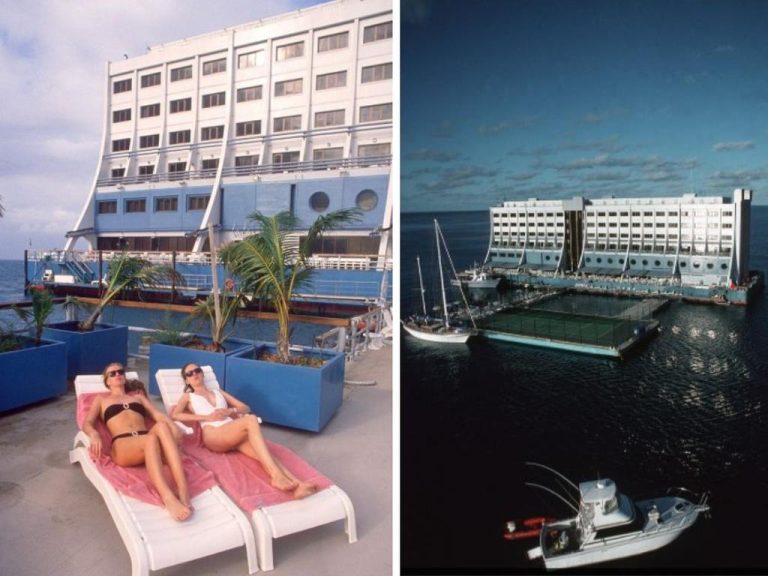Growing presence of churches in commercial property market

Commercial businesses are buying an increasing number of traditional church properties as church congregations choose to vacate in favour of less conventional buildings.
One such property is Shepparton Uniting Church , 190km north of Melbourne, which is on the market for the first time in its 134-year-old history.
Heading to auction this Friday, the two-for-one deal comprises two heritage-listed churches on two separate titles and set on an 1800sqm, which will be sold as one lot.
A red brick church, built in 1888, sits adjacent to another church constructed in 1930 and includes a large foyer, change room and a toilet block along with a working organ, stained-glass windows and soaring timber panelled ceilings.
Cardamone Real Estate director Peter Cardamone explained the older building needed some TLC particularly a new floor and fresh paint.
However, with both churches being heritage-listed, they can’t be demolished or removed and the new owners will only be allowed to renovate the churches’ interiors, he said.
Yet even with this restriction, buyer interest in the unusual property has been strong with restaurateurs, business entrepreneurs and other church congregations keen to snap it up.
“The opportunities are endless – it just depends on how deep your pockets are,” Mr Cardamone said.
Mr Cardamone added that there was also the major emotional perspective to be considered in selling a property with so much sentimental and spiritual value behind it.
“This property is iconic with a lot of history and there is a lot of responsibility and emotion behind this sale,” he said.
Traditional Newcastle church tempts plenty of buyers
Another traditional church building on the shores of New South Wales’ Lake Macquarie, near Newcastle, is also turning heads.
St David’s Anglican Church‘s current owner purchased it four years ago from the Diocese of Newcastle and thoroughly renovated it before turning it into a yoga studio

The former St David’s Anglican Church, near Newcastle NSW, is now a yoga studio. Picture: Harcourts Newcastle
Zoned B1, the charming building is set on 1011sqm and comes with an adjacent hall, a kitchen and toilet facilities, and is surrounded by landscaped gardens.
Harcourts Newcastle sales agent, Daniel Byrnes, said potential buyers included investors looking to hold onto the property long term as well as consulting businesses, with interest mainly coming from the local area where the property was well known.
“Another person is also looking to do a yoga studio and we’ve had dance studios interested as well,” he said.
The property’s only downside is its zoning which makes living on-site very difficult, if not impossible, Mr Byrnes said.
“A lot of people want to convert it into a home or into an Airbnb but under the B1 council zoning, it requires quite a lot of work to do this,” he said.
“You’d have to build on top of the hall at the back, which obviously comes with a big cost.”
Unconventional Christian sites escalate
The other side to such sales is that Christian congregations are not only moving but changing to unconventional premises, according to REA Group economist Anne Flaherty.

Shepparton Uniting Church features two heritage-listed churches on two separate titles. Picture: realcommercial.com.au
Ms Flaherty explained that the move to non-traditional properties and buildings such as industrial warehouses, offices and retail sectors had grown in recent years.
“When it comes to the kinds of buildings churches are looking to occupy, there is a wide variation,” she explained.
“They’re looking for a large space that fits a lot of people that they can convert.”
“People looking to buy a space for a church are now even looking at offices as appropriate buildings to use, and so buy.”
The need to renovate their new property is why churches are far more likely to buy a property than to lease it, Ms Flaherty explained.
“Of the searches on realcommercial including the keyword “church”, 89% were searches to buy and 11% were searches to lease,” she said.

St David’s Anglican Church is attracting plenty of interest because of its quirky traditional charm. Picture: Harcourts Newcastle
Offices, in particular, as well as industrial properties are proving popular for expanding churches, or those looking to move, Ms Flaherty explained.
“‘Church’ was the 8th most included keyword by congregations searching to buy offices, a figure up 105% in 2021 compared to the year before,” she said.
“This suggests to me that the people searching for an office are actually looking to use the space as a church.
“In the same way, for those searching to buy an industrial property, ‘church’ was the 14th most included keyword, which is up 31% when comparing 2021 with 2020.”
Different building requirements are also needed for places of worship, according to Ms Flaherty, which was why it was sensible for those looking to buy a church – even an unconventional one such as an office – to include ‘church’ as a keyword as this ensured the building had already met these requirements.
“Churches are changing what they’re looking for and there’s a growing demand from churches for commercial property,” she said.
“It actually doesn’t make that much sense to hold onto really expensive heritage buildings that cost a fortune to upkeep.
“It’s a lot more practical to buy a different sort of a property where you don’t have to worry about really expensive maintenance.
“Something like an industrial property is actually quite perfect because you can house a large number of people there and the space is relatively easy to adapt.”

While fully renovated, there’s still plenty of classic Christian details at St David’s Anglican Church. Picture: Harcourts Newcastle
Ms Flaherty said it was difficult to make the claim that more traditional church buildings were appearing on the market because of growth within the Christian church.
“But I think it’s reasonable to say that there are people who are interested in buying properties to use as churches,” she said.
Properties like St David’s are definitely popular for their unusual quirky charm, according to Mr Byrnes.
“There’s nothing quite like this property available at the moment across Newcastle,” he said.
“It’s something a little bit different with character and history that investors and buyers are loving.”
“It also provides a different alternative for businesses to not have just four walls, a window and a front door.”
It’s a win-win for both commercial buyers and church congregations with Mr Cardamone explaining communities such as Shepparton Uniting can benefit from selling their historic properties.
“This church is potentially selling these huge assets on this big block and putting that capital into other properties they’ve got and upgrading them,” he said.
Shepparton Uniting Church will go to auction on-site on Friday, January 28 at 7pm, with a price guide of $1 million plus.
The former church at Teralba, NSW, has a price guide of $750,000-$800,000.







